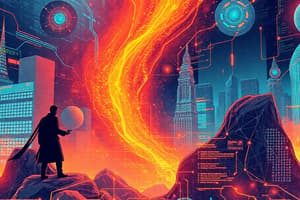Podcast
Questions and Answers
An information system (IS) consists of unrelated components that do not provide feedback.
An information system (IS) consists of unrelated components that do not provide feedback.
False (B)
Data refers to raw facts, whereas information is a collection of facts organized in a valuable manner.
Data refers to raw facts, whereas information is a collection of facts organized in a valuable manner.
True (A)
Knowledge is defined as the ability to produce raw facts.
Knowledge is defined as the ability to produce raw facts.
False (B)
If information is inaccurate or incomplete, it can lead to poor decision-making.
If information is inaccurate or incomplete, it can lead to poor decision-making.
Efficiency is measured by what is consumed divided by what is produced.
Efficiency is measured by what is consumed divided by what is produced.
A system is defined as a set of elements that interact to accomplish goals.
A system is defined as a set of elements that interact to accomplish goals.
The characteristics of information become less important depending on the type of data needed.
The characteristics of information become less important depending on the type of data needed.
Processing mechanisms are not considered a component of a system.
Processing mechanisms are not considered a component of a system.
Effective systems are measured by how well they attain their goals.
Effective systems are measured by how well they attain their goals.
Feedback is not an essential part of an information system.
Feedback is not an essential part of an information system.
An information system includes input, processing, output, and feedback mechanisms.
An information system includes input, processing, output, and feedback mechanisms.
Mobile commerce refers to any business transaction executed using fixed wired devices.
Mobile commerce refers to any business transaction executed using fixed wired devices.
A decision support system (DSS) is mainly focused on routine information rather than problem-specific decision making.
A decision support system (DSS) is mainly focused on routine information rather than problem-specific decision making.
Intranet refers to a public network that allows anyone to access a company's internal resources.
Intranet refers to a public network that allows anyone to access a company's internal resources.
Artificial intelligence includes systems that can learn from past mistakes.
Artificial intelligence includes systems that can learn from past mistakes.
Enterprise resource planning (ERP) systems only manage financial operations.
Enterprise resource planning (ERP) systems only manage financial operations.
Feedback in an information system helps to make changes in input or processing activities.
Feedback in an information system helps to make changes in input or processing activities.
Knowledge management systems (KMSs) are focused on creating, storing, sharing, and using the organization's hardware.
Knowledge management systems (KMSs) are focused on creating, storing, sharing, and using the organization's hardware.
Computer literacy refers to understanding how centers process information across the globe.
Computer literacy refers to understanding how centers process information across the globe.
Transaction processing systems (TPS) are used to manage technical support services.
Transaction processing systems (TPS) are used to manage technical support services.
Extranet is a private network that allows outsiders to access certain internal resources of a company.
Extranet is a private network that allows outsiders to access certain internal resources of a company.
Robotics in artificial intelligence refers to machines that automate routine tasks.
Robotics in artificial intelligence refers to machines that automate routine tasks.
Electronic business (e-business) encompasses all business functions performed online.
Electronic business (e-business) encompasses all business functions performed online.
The Internet is the world’s smallest computer network with limited resources.
The Internet is the world’s smallest computer network with limited resources.
Flashcards are hidden until you start studying
Study Notes
Information Systems
- An information system is a combination of components that gather, alter, and distribute data and information, providing feedback to achieve a specific objective.
- Information systems play a crucial role in helping businesses accomplish their goals, boost revenue, and minimize costs.
Information Concepts
- Information is a valuable resource for organizations and is often confused with data.
Data vs. Information
- Data: Raw, unorganized facts.
- Information: Organized data, providing value beyond the facts themselves.
- Process: A series of logically related tasks performed to achieve a specific outcome.
- Knowledge: Understanding and awareness of information and its potential to support tasks.
The Value of Information
- Inaccurate or incomplete information can lead to poor decision-making, potentially costing businesses significant amounts of money.
- The importance of certain information characteristics varies depending on the type of data needed.
Information Characteristics
- Accuracy: The information reflects the real world accurately.
- Completeness: All necessary data is included.
- Consistency: Information is the same across different sources.
- Timeliness: Information is available when needed.
- Relevance: Information is useful for the task at hand.
- Value: Information is beneficial to the organization.
Systems
- A system is a collection of interconnected elements or components that work together to achieve a common goal.
- Key components of a system include: Inputs, processing mechanisms, outputs, and feedback.
System Performance
- Efficiency: Measures the ratio of output produced to resources consumed.
- Effectiveness: Gauges how well a system achieves its intended goals.
- Performance Standards: Specific objectives outlining the desired performance of the system.
Information Systems
- An information system (IS) collects, manipulates, stores, disseminates data, and provides feedback to meet objectives.
- Input gathers raw data, processing converts data into useful outputs, output produces information, and feedback is used to make changes to input or processing.
Computer-Based Information Systems (CBIS)
- A CBIS is a collection of hardware, software, databases, telecommunications, people, and procedures configured to process data into information.
- Technology infrastructure includes all components of a CBIS.
- Hardware encompasses equipment used for input, processing, storage, and output.
- Software consists of programs governing computer operation.
- A database is an organized collection of facts and information.
- Telecommunications refers to electronic signal transmission for communication.
- Networks connect computers and equipment for electronic communication, the Internet being the largest interconnected network.
- The Web is a network of links on the Internet.
- Intranets are internal networks for information exchange within organizations.
- Extranets are Web-based networks allowing authorized external parties access to intranet resources.
- People are the most important element in most CBIS.
- Procedures encompass strategies, policies, methods, and rules for using the CBIS.
Business Information Systems
- Common types of information systems include those for electronic and mobile commerce, transaction processing, management information, and decision support.
- Organizations may use special-purpose systems like virtual reality.
Electronic and Mobile Commerce
- E-commerce involves business transactions executed electronically between companies (B2B), companies and consumers (B2C), consumers (C2C), businesses and the public sector, or consumers and the public sector.
- Mobile commerce (m-commerce) uses wireless devices for business transactions.
- E-procurement uses information systems and the Internet for acquiring parts and supplies.
- E-commerce streamlines work activities.
- Electronic business (e-business) uses information systems and the Internet for all business tasks and functions.
Enterprise Systems
- A transaction is any business-related exchange.
- A transaction processing system (TPS) processes and records completed business transactions.
- Enterprise resource planning (ERP) is a set of integrated programs that manage vital business operations for a global organization.
- Most ERP systems provide integrated software for manufacturing and finance.
Information and Decision Support Systems
- A management information system (MIS) provides routine information to managers and decision makers, focusing on operational efficiency.
- A decision support system (DSS) aids in problem-specific decision making, focusing on effective decisions and used when problems are complex and required information is difficult to obtain.
Specialized Business Information Systems
- Knowledge management systems (KMSs) create, store, share, and utilize organizational knowledge and experience.
- Artificial intelligence (AI) enables computer systems to exhibit human-like intelligence.
- Robotics allows machines to perform complex, dangerous, or routine tasks.
- Vision systems allow devices to see, store, and process images.
- Natural language processing enables computers to understand and act on verbal or written commands.
- Learning systems allow computers to learn from past experiences.
- Neural networks enable computers to recognize and act on patterns and trends.
- Expert systems provide expert-like suggestions in specific fields with a knowledge base containing data, rules, procedures, and relationships.
- Virtual reality simulates real or imagined environments in three dimensions.
Systems Development
- Systems development involves creating or modifying existing business systems.
- Mobile application creation is expected to increase.
- Outsourcing allows companies to focus on core competencies by delegating other functions to specialized companies.
Systems Investigation and Analysis
- Systems investigation gains an understanding of the problem or opportunity.
- Systems analysis defines problems and opportunities of the existing system.
Systems Design, Implementation, and Maintenance & Review
- Systems design determines how the new system will function to meet business needs defined during analysis.
- Systems implementation involves creating or acquiring system components, assembling them, and putting the new system into operation.
- Systems maintenance and review ensures the system continues to meet changing business needs.
Information Systems in Society, Business, and Industry
- Information systems are developed to meet the needs of all types of organizations and individuals.
- The speed and widespread use of information systems can expose users to ethical threats.
Security, Privacy, and Ethical Issues
- Computer-related mistakes and waste are a concern.
- Ethical issues concern what is generally considered right or wrong.
- Individual privacy is an important social issue, with the potential for personal information to be inadvertently disclosed, lost, or stolen.
- Many Internet sites collect personal and financial information.
- Social networks can pose challenges in the workplace.
- Security and control measures are needed to protect privacy and data.
- Laws have been passed to protect individuals from privacy invasions.
- The use of information systems can raise work-related concerns, including job loss due to increased efficiency and potential health problems.
Computer and Information Systems Literacy
- Computer literacy involves knowledge of hardware, software, databases, and telecommunications and how they function.
- Information systems literacy encompasses knowledge of how data and information are used by individuals, groups, and organizations, including understanding the application of technology.
Information Systems in the Functional Areas of Business
- Information systems are applied in various functional areas of business, including finance and accounting, sales and marketing, manufacturing, human resource management, and legal information systems.
Information Systems in Industry
- Information systems are utilized across various industries, including airlines and transportation, investment firms and banks, publishing companies, healthcare maintenance organizations (HMOs), retail companies, power management and utility companies, and professional services and management consulting firms.
Global Challenges in Information Systems
- Global challenges in information systems include cultural and language differences, time and distance challenges, infrastructure variations, currency differences, product and service considerations, technology transfer issues, state, regional, and national laws, and trade agreements.
Studying That Suits You
Use AI to generate personalized quizzes and flashcards to suit your learning preferences.




